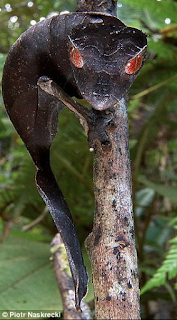I BE-LEAF YOU CAN’T
SEE HIM!
This creature enthralls my son, Erik. As a matter of fact,
he is so fascinated by it that he insisted I write a Leaf-Tailed Gecko into one
of my books, and so I did. In my next Australian Fantasy Adventure, we meet
Simon, the Destroyer. Simon happens to be a Leaf-Tailed Gecko. I’m not going to
tell you much about Simon. Let’s just say that he’s a hired killer!
For now, I’d like you to say ‘Hello’ to the real Leaf-Tailed Gecko.
Handsome fellow, isn’t he?
There are a several different species of Leaf-Tailed Gecko
and they all live in the same place, Madagascar and the islands off of
Madagascar.
Madagascar is an island
located off the southeastern shore of Africa.
They are extremists in the game of camouflage. Skilled at
hiding themselves, their skin is rough, and in many cases looks like the bark
of a tree or dried leaves that litter the ground. Their tails are shaped liked
leaves and the patterns on their heads further help them to blend in with their
surroundings. They live in tropical forests and you’ll more than likely find
them clinging vertically to a tree, or resting in the leaves on a branch way
above your head. They wrap their flat tails around branches to help stabilize
them while at rest or as they slowly move along.
These are nocturnal creatures spend the nighttime
hours searching for insects and other invertebrates they deem to make a tasty
meal. Some Leaf-Tailed Geckos are so big that they have been known to hunt and
eat small reptiles as well. They range in size from four to twelve inches in
length.
The Satanic Leaf-Tailed Gecko
(Photo credit: Piotr Naskrecki)
They have no eyelids, just a clear membrane that protects
the eye. This is why you have seen them ‘licking’ their eyes with their
tongues. In researching these creatures, I have read that they are the only
reptiles who actually have a voice. I can’t verify that because I haven’t heard
them.
They are equipped with special feet. There are small claws
on their front feet and adhesive type structures on their back feet. It has
been suggested that their ability to stick to smooth surfaces is due to Van der
Waals force. Van der Waals force is a bit complicated, but it has to do with forces
at the molecular level. Van
der Waals is the sum of the attractive or repulsive forces between molecules.
Here are three known species of the Leaf-Tailed Gecko that stopped to have their photo taken. Thanks to Arkive.org for these beautiful pics!
Leaf-tailed
gecko (Uroplatus ebenaui)
(vulnerable, according to IUCN)
Paluma
Range leaf-tailed gecko (Phyllurus
gulbaru)
(critically endangered, according to IUCN)
Satanic leaf-tailed
gecko (Uroplatus phantasticus)
(least concern, according to IUCN)
Leaf-Tailed Gecko (http://arkive.org)
Paluma Range Leaf-Tailed
Gecko (http://arkive.org)
Satanic Leaf-Tailed Gecko (http://arkive.org)
Some species are under threat due to habitat
destruction and the exotic pet trade.
The Satanic Leaf-Tailed Gecko fascinates me. It can twist
its body in such a way that it looks just like a leaf.
And it certainly is the stuff of horror stories and
nightmares.
Satanic Leaf-Tailed Gecko (Photo credit: Piotr Naskrecki)
I’ve found a fabulous, very short video, which will show you
how well this creature has mastered the art of camouflage. You’ll also have a
chance to see him ‘licking’ his marbleized eye!
I hope you enjoyed this weeks post enough to share it with
your friends and family.
For more information on the Leaf-Tailed Gecko, visit the
following sites:
Enjoy!
Jeanne E. Rogers, Award Winning Author
The Sword of Demelza and The Gift of Sunderland
Middle Grade Fantasy Where Endangered Animal Heroes Roam the
Pages!









